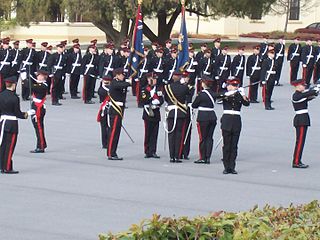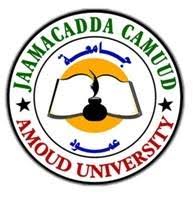Related Research Articles

A military academy or service academy is an educational institution which prepares candidates for service in the officer corps. It normally provides education in a military environment, the exact definition depending on the country concerned.

The Royal Military College of Canada, abbreviated in English as RMC and in French as CMR, is a military academy and, since 1959, a degree-granting university of the Canadian Armed Forces. It was established in 1874 and conducted its first classes on June 1, 1876. Programs are offered at the undergraduate and graduate levels, both on campus as well as through the college's distance learning program via the Division of Continuing Studies.
The United States service academies, also known as United States military academies, are federal academies for the undergraduate education and training of commissioned officers for the United States Armed Forces.

The Air Force Reserve Officers' Training Corps (AFROTC) is one of the three primary commissioning sources for officers in the United States Air Force and United States Space Force, the other two being the United States Air Force Academy (USAFA) and Air Force Officer Training School (OTS). A subordinate command of the Air University within the Air Education and Training Command (AETC), AFROTC is aligned under the Jeanne M. Holm Center for Officer Accessions and Citizen Development at Maxwell AFB, Alabama. The Holm Center, formerly known as the Air Force Officer Accession and Training Schools (AFOATS), retains direct responsibility for both AFROTC and OTS.
University admission or college admission is the process through which students enter tertiary education at universities and colleges. Systems vary widely from country to country, and sometimes from institution to institution.
Staff colleges train military officers in the administrative, military staff and policy aspects of their profession. It is usual for such training to occur at several levels in a career. For example, an officer may be sent to various staff courses: as a captain they may be sent to a single service command and staff school to prepare for company command and equivalent staff posts; as a major to a single or joint service college to prepare for battalion command and equivalent staff posts; and as a colonel or brigadier to a higher staff college to prepare for brigade and division command and equivalent postings.

The Defence Academy of the United Kingdom provides higher education for personnel in the British Armed Forces, Civil Service, other government departments and service personnel from other nations.

6th of October is a city in the Giza Governorate of Egypt. It is a satellite city, located adjacent to Giza, and is part of the Greater Cairo region.

The Saudi Arabian Army, officially the Royal Saudi Land Forces, is the principal land warfare branch of the Armed Forces of Saudi Arabia. It is part of the Saudi Ministry of Defense, which is one of the two military departments of the government of Saudi Arabia, together with the Ministry of National Guard. Its primary mandate is the defense of Saudi Arabia’s territory and the safeguarding of national interests against external threats.

Amoud University is a comprehensive public university, located in the city of Borama in Somaliland.

The Turkish Naval Academy is a four-year co-educational military academy and part of the National Defence University. It is located in the district of Tuzla in Istanbul. Its mission is to develop cadets mentally and physically for service as commissioned officers in the Turkish Navy. It must not be confused with Naval War Institute.
The Polytechnic University of the Philippines College Entrance Test, commonly known as PUPCET, is part of the admission requirements in the Polytechnic University of the Philippines, administered to graduates of Philippine and foreign high schools. It is used to measure the capability of incoming students depending on what degree will the applicant choose. PUPCET is one of the most competitive entrance examinations in the Philippines. Of an estimated 50,000 annual entrance test examinees for the main campus in Manila, only 8,000 will be accepted due to the university's limited budget. Due to covid restrictions this temporarily suspended and implements College Admission Evaluation of Polytechnic University of the Philippines or CAEPUP.

Education in Gabon is largely based on the French educational system. On the federal level, it is regulated by two Ministries: the Ministry of Education, which is in charge of Pre-school through to High School, and the Ministry of Higher Education and Innovative Technologies, which is in charge of universities and professional schools.
Kadett corresponds to cadet in English and is a term used in Sweden to denote officer candidates studying in order to become an officer. There are basically two ways to become officer as described below.

Major General Alfred Claude Nelson-Williams, GCOR is a retired Major General in the Republic of Sierra Leone Armed Forces (RSLAF). Nelson-Williams previously served as Chief of Defense Staff for Sierra Leone from 2008 to 2010.

The Military Academy of the University of Defence is a college devoted to military education and career development located in Belgrade, Serbia. The academy forms part of the Serbian higher education system, offering accredited graduate and postgraduate curriculum. It contains a undergraduate military college as well as postgraduate studies.

An officer is a person who holds a position of authority as a member of an armed force or uniformed service.
A high school diploma is a diploma awarded upon graduation of high school. A high school diploma is awarded after completion of courses of studies lasting four years, from grade 9 to grade 12. It is the school leaving qualification in the United States and Canada.
The adjunctura is a military analogue of civilian graduate school in Russia, which allow commissioned officers to get academic degree of candidate of military sciences and be appointed to teaching and scientific positions in military educational and scientific research institutions.
The Egyptian Armaments Authority (EAA) is one of the bodies of the Egyptian Armed Forces, and was previously known as the Technical Authority.
References
- ↑ Military Colleges - A Brief History Archived July 28, 2017, at the Wayback Machine.
- ↑ Legal Publications - Establishment of the Armed Forces Technical Institute Archived May 19, 2020, at the Wayback Machine.
- ↑ Akhbar Al-Youm - Maj. Gen: The idea of the Military Technological College was encouraged by the president Archived September 28, 2022, at the Wayback Machine.
- ↑ "بشأن إنشاء المعهد الفني للقوات المسلحة". site.eastlaws.com.
- ↑ "إعجاز سلاح المهندسين في حرب اكتوبر". group73historians.com.
- ↑ "المهندسون العسكريون المصريون". yom-kippur-1973.info.
- ↑ "أحد أبطال حرب أكتوبر يكشف دور المهندسين العسكريين بالمعركة". دار الهلال.
- ↑ "في ذكرى إنتصارات أكتوبر.. سلاح "المهندسين العسكريين" المفاجأة التي أذهلت العدو". الجمهورية اون لاين. November 7, 2024.
- 1 2 3 https://www.mtc.edu.eg/mtcwebsite/ArStudyingProgram.aspx Military Technical College — Bachelor's Program
- ↑ Akhbar Al-Youm- Director of the Armed Forces Technical Institute: We have all the specialties for technical insurance of equipment Archived December 29, 2017, at the Wayback Machine.
- ↑ "نظام الدراسة - الكلية الفنية". academy.mod.gov.eg.
- ↑ "شروط القبول - المعهد الفني". academy.mod.gov.eg.
- 1 2 "تعرف على شروط الالتحاق بالكلية الفنية العسكرية عام 2024". اليوم السابع. July 17, 2024.
- ↑ Al Youm Al Sabe'a - Military Technological College signs cooperation protocol with a number of universities Archived 2023-04-16 at the Wayback Machine.
- ↑ Al-Masry Al-Youm - Hossam El-Din Mustafa: The idea of a military technological college was encouraged by President El Sisi Archived 2022-09-17 at the Wayback Machine.
- ↑ Al-Watan - Director of the Technical Institute: We are preparing a "fighting technician" capable of confronting challenges and hostilities Archived July 23, 2018, at the Wayback Machine.
- ↑ "Al Youm Al Sabe'a - On the sidelines of the graduation of a new batch of the Armed Forces Technical Institute." Archived from the original on 2020-03-08.
- ↑ Al-Ahram - In Pictures The great scientist Farouk El-Baz is a guest of the Military Technical College. Archived July 05, 2015 at the Wayback Machine.
- ↑ Al-Ahram - in pictures Morsi witnesses martial arts demonstrations at the graduation ceremonies of the Armed Forces Technical Institute and the Military Technical Institute. Archived January 05, 2016 at the Wayback Machine.
- ↑ Al-Ahram - Tantawi attends the graduation of a new batch of the Armed Forces Technical Institute. Archived February 20, 2016 at the Wayback Machine.
- ↑ Al-Ahram - Field Marshal Tantawi attends the graduation ceremony of a new class at the Armed Forces Technical Institute. Archived June 30, 2015 at the Wayback Machine.
- ↑ Al-Ahram - The Armed Forces celebrate the graduation of a new class at the Technical Institute. Archived March 13, 2016 at the Wayback Machine.
- ↑ Al-Ahram - Deaths. Archived June 30, 2015 at the Wayback Machine.